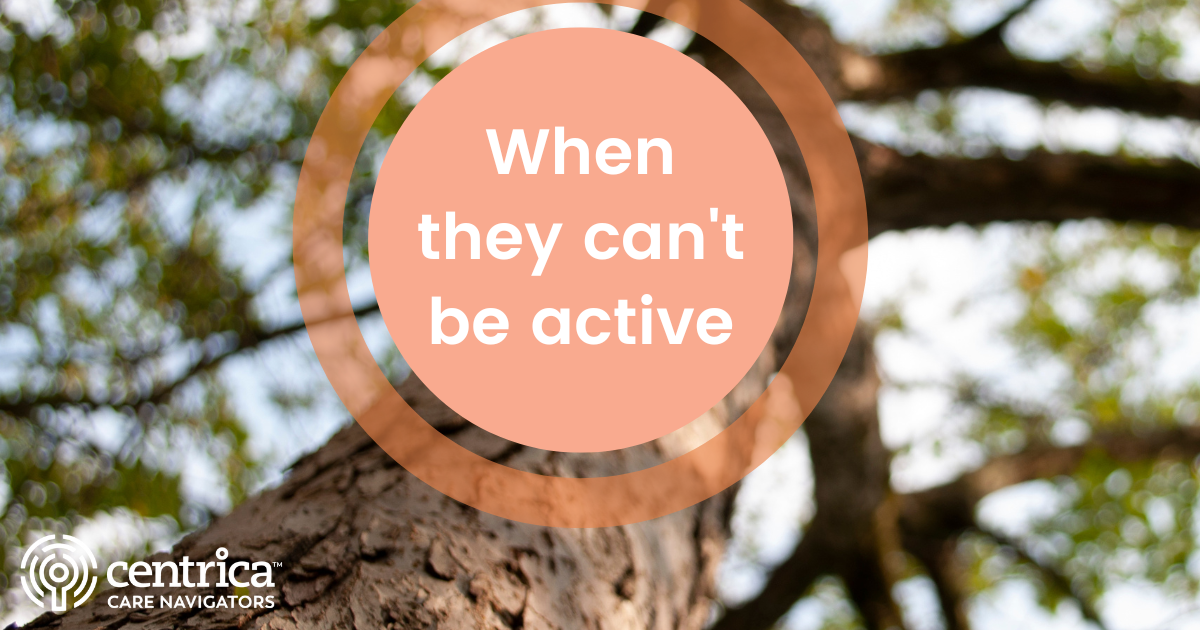In an episode of the fantasy TV show “The Sandman,” an old man dies in his bedroom, and one of the show’s magical main characters escorts him to his afterlife. Just before he dies, though, he has time to finish playing a song on his violin, then says a prayer.
While the man is a fictional character, he’s an example of staying active and doing things even in the last moments before death. Since he’s capable of doing more than simply lying in bed, he’s still doing things he enjoys.
Many people receiving end-of-life care remain active, and they often want to see family and friends. They may not be ready to rush out and play a game of soccer, but there are plenty of activities that are appropriate for them.
The first thing you may think of is just sitting and talking, and there’s absolutely nothing wrong with that. When they’re visiting with others, our patients and guests often recall important moments in their lives, or discuss what’s happening in their world. Our social workers, chaplains, and others want to keep people talking to help them stay aware of where they are and what they’re doing.
There are other options, too, for simple things that can keep people engaged without demanding a lot from them. Some of our recommendations include:
Visiting with a chaplain or social worker
Everyone who receives Centrica Care Navigators services has a care team, which includes a doctor and nurse keeping a close eye on their patient’s condition. Social workers and chaplains are part of the interdisciplinary group (IDG) that meets with each and every one of our patients when they first receive service from us. While doctors and nurses help with medical care, social workers and chaplains help with spirituality and social and emotional well-being.
Pray or read from the Bible (or other text)
Patients who have a strong background in their faith often continue worship throughout their lives. Our chaplains say it’s important to “meet patients where they are,” which can include everything from talking about matters of faith to reading long passages from the Bible.
Talk with a social worker to help make special meetings (like reunions) happen if possible
You may have joined us for a performance of Tuesdays with Morrie at the Kalamazoo Civic Theatre in August 2022. In the play, the dying Morrie gives a memorable piece of advice: “Forgive yourself before you die. Then forgive others.”
Sometimes, forgiveness means that a patient reconnects with family or friends they haven’t talked to for many years. Centrica Care Navigators social workers can help mend those relationships and get people talking with one another. Sometimes conversations that should have taken place for a patient never do. That can lead to emotional stress in addition to the physical and mental challenges the patient is already facing with their disease.
Spending time with animals
Some of our Centrica Care Navigators volunteers don’t volunteer alone: they bring their dogs, too. Pet therapy animals are skilled at doing what a patient wants, whether that’s standing nearby so they can be petted or just relaxing in a room so the patient has a little companionship from time to time.
Listening to music
Our IDG has music therapists, who do much more than just play guitar and sing. Their work makes patients comfortable and helps them connect with others. When music therapists aren’t available, streaming a patient’s favorite kind of music can give everyone something to enjoy.
Write a journal
Talking with your loved one is a great way to learn about who they are and what they cared about all through their lives. It doesn’t just have to be a conversation, though. A patient can talk into a recorder so others can go back and hear their voice as well as their thoughts. Or a patient could keep a journal, writing down what’s most significant to them.
Taking that extra step to write down thoughts instead of only saying them means patients can focus more on what they really mean.
We also encourage people to talk about themselves and their experiences in our Story Catcher program. It’s an opportunity to capture memories in a recording so they can be listened to for years to come.
Remember that all of these ideas are just options; if you’re visiting a loved one in our care, some things may not be possible, if they’re physically or mentally not ready to do them. Others might just be things they don’t want to do!
Family and friends who visit a patient in end-of-life care don’t have to simply sit quietly. There are plenty of activities they can do together, even when being physically active is too much.




